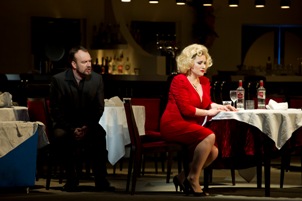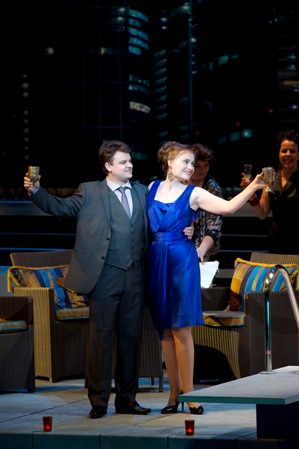The Tsar's Bride, Royal Opera | reviews, news & interviews
The Tsar's Bride, Royal Opera
The Tsar's Bride, Royal Opera
Rimsky-Korsakov's melodrama lacks A-list casting in semi-plausible update
Long before the curtain rose on this soapy operatic tale of power and poison, one big question loomed: could director Paul Curran, could anyone, bring Rimsky-Korsakov's sweet, doomed and very Russian bride to convincing life? The music's mostly strong, and unusually singer-friendly for this composer; the historically dodgy plot's patchy, but not inimical to resetting in the queasy milieu of the new Russian rich. Given the bloodstained start in a swish Moscow restaurant, I thought Curran could be on to something, but by the end of the evening it was just a tawdry old melodrama dressed up in flashy suits.
For which Korsakov and his fitful dramaturgy are mostly, though ultimately not entirely, to blame. Unlike Musorgsky's operas and Tchaikovsky's Mazeppa, which tend of late to have been relocated to more recent turbulences in Russian history, this rare exception to a relatively overshadowed composer's supernatural rule is a work too polished and even genteel to engage much with the motherland's recurring cycles of violence. Yes, the brutal "iron ring" of Oprichniki created by Ivan the Terrible - the rapid demise of whose third wife is the very loose basis for the opera - has stayed with us through Soviet and now state-controlled mafioso times. But if all it boils down to in The Tsar's Bride are roistering cries of "goy-da!", a couple of rousing choruses and a jolly little dance for the torching of a nobleman's house, your subtext-seeking director isn't going to get very far.
Much more important is the central casting. No-one should really care why jilted moll Lyubasha grabs the wrong end of the stick and thinks for no good reason that her old love Gryaznoy's infatuation with pretty ingenue Marfa is reciprocated. What matters is that the uneven triangle yields plum roles for tigress mezzo, testosterone-driven baritone and floaty lyric soprano (the role of the big boss - Putin? - whose choice takes the heroine away from her true love, is silent). As key recordings and the one, very old-fashioned production I've seen in Moscow prove, The Tsar's Bride needs great singers: Olga Borodina and Dmitri Hvorostovsky in long-lined combat, Elena Obraztsova bringing the house down at the Bolshoi, even a miscast but very charismatic Galina Vishnevskaya as the heroine.
Covent Garden, alas, fields a B-team for the three leads. Johan Reuter has threatening presence but can't send the phrases winging, Hvorostovsky-fashion, in the aria his power-failing thug has to sing at curtain-up. Both Ekaterina Gubanova as Lyubasha and Marina Poplavskaya as Marfa pull out the stops at the tops of their respective registers, but underproject in mid-range; the cameo from Elizabeth Woollett as pushy mother Domna Ivanovna Saburova, bringing tipsily to life her selective narrative of Ivan's inconclusive bride-choosing, shows what they lack in terms of keeping the energy levels flowing.
 While Gubanova (pictured right with Reuter) does at least stay pitch-perfect and soulful in the tricky unaccompanied quasi-folksong of Act I, as well as reasonably tormented, if uncomfortable, in her tight skirt and big blonde wig seeking a fatal potion from Vasily Gorshkov's oleaginous outsider physician Bomelius in Act II, the torch Lyubasha passes to Marfa in Act IV as her revenge slowly destroys its target flickers dimly. What's the big deal about Poplavskaya, fêted for her Verdi in New York as she never quite was here? The voice seems unfocused and in parts; she could run into the same problems as the much more lustrous Gorchakova once did in the disjunction between flaming top notes and the rest of the instrument. She does bring a luminosity to ensembles, especially the lovely quartet of short-lived happiness in Act II, but that's about as far as it goes.
While Gubanova (pictured right with Reuter) does at least stay pitch-perfect and soulful in the tricky unaccompanied quasi-folksong of Act I, as well as reasonably tormented, if uncomfortable, in her tight skirt and big blonde wig seeking a fatal potion from Vasily Gorshkov's oleaginous outsider physician Bomelius in Act II, the torch Lyubasha passes to Marfa in Act IV as her revenge slowly destroys its target flickers dimly. What's the big deal about Poplavskaya, fêted for her Verdi in New York as she never quite was here? The voice seems unfocused and in parts; she could run into the same problems as the much more lustrous Gorchakova once did in the disjunction between flaming top notes and the rest of the instrument. She does bring a luminosity to ensembles, especially the lovely quartet of short-lived happiness in Act II, but that's about as far as it goes.
 In any case, her final mad scene needs something more from the production. Kevin Knight's applause-winning designs take us from penthouse roof terrace to claustrophobic palace gilt, but the ceiling surely needs to lift as Marfa spiritually soars; this is, as the composer's amanuensis Yastrebtsev put it, Goethe's "eternal feminine" leading us aloft. In Act II Rimsky-Korsakov has already paved the way for Marfa's pretty entrance number with musical evocation of a Russian babi lyeta or "granny's summer" outside a monastery; all we get here are drably lit posters and a grubby street scene.
In any case, her final mad scene needs something more from the production. Kevin Knight's applause-winning designs take us from penthouse roof terrace to claustrophobic palace gilt, but the ceiling surely needs to lift as Marfa spiritually soars; this is, as the composer's amanuensis Yastrebtsev put it, Goethe's "eternal feminine" leading us aloft. In Act II Rimsky-Korsakov has already paved the way for Marfa's pretty entrance number with musical evocation of a Russian babi lyeta or "granny's summer" outside a monastery; all we get here are drably lit posters and a grubby street scene.
Curran's blocking and David Martin Jacques's lighting might also have done more to bathe in light the innocents, Marfa and her childhood sweetheart, Lïkov - not much of a part for the tenor, though bolstered by the buoyant extra aria Rimsky-Korsakov inserted in Act III. That highlight was ringingly sung by stalwart Ukrainian Dmytro Popov (pictured above with Poplavskaya), giving the most straightforwardly successful major performance of the evening. The role of the concerned father as sung by a now spreading-toned Paata Burchuladze has little of the impact it can with a rock-solid bass. There's certainly promise from a younger specimen of that rare phenomenon, Alexander Vinogradov, but in the merest cipher of a part.
So that leaves the glories to the orchestra under Mark Elder, and the playing gets off to a sprightly start with Korsakov's almost Neo-Classical overture, wisely spared any stage business - though it seems a shame to cut the melancholy Act II interlude. There's drive, there's some splendour, especially in conjunction with an often very Russian-sounding chorus; but like the evening's corseted heroine and the too realistically confined limits of its production, even here nothing quite soars above the earthly as it can.
- Further performances of The Tsar's Bride at Covent Garden until 2 May
- Details of the Royal Opera's 2011-12 season on theartsdesk
- A little more context on David Nice's blog
Watch Marfa's delirium aria and the final scene in the more conventional but often imaginative 1966 Russian film
more Opera
 Aci by the River, London Handel Festival, Trinity Buoy Wharf Lighthouse review - myths for the #MeToo age
Star singers shine in a Handel rarity
Aci by the River, London Handel Festival, Trinity Buoy Wharf Lighthouse review - myths for the #MeToo age
Star singers shine in a Handel rarity
 Carmen, Royal Opera review - strong women, no sexual chemistry and little stage focus
Damiano Michieletto's new production of Bizet’s masterpiece is surprisingly invertebrate
Carmen, Royal Opera review - strong women, no sexual chemistry and little stage focus
Damiano Michieletto's new production of Bizet’s masterpiece is surprisingly invertebrate
 La scala di seta, RNCM review - going heavy on the absinthe?
Rossini’s one-acter helps young performers find their talents to amuse
La scala di seta, RNCM review - going heavy on the absinthe?
Rossini’s one-acter helps young performers find their talents to amuse
 Death In Venice, Welsh National Opera review - breathtaking Britten
Sublime Olivia Fuchs production of a great operatic swansong
Death In Venice, Welsh National Opera review - breathtaking Britten
Sublime Olivia Fuchs production of a great operatic swansong
 Salome, Irish National Opera review - imaginatively charted journey to the abyss
Sinéad Campbell Wallace's corrupted princess stuns in Bruno Ravella's production
Salome, Irish National Opera review - imaginatively charted journey to the abyss
Sinéad Campbell Wallace's corrupted princess stuns in Bruno Ravella's production
 Jenůfa, English National Opera review - searing new cast in precise revival
Jennifer Davis and Susan Bullock pull out all the stops in Janáček's moving masterpiece
Jenůfa, English National Opera review - searing new cast in precise revival
Jennifer Davis and Susan Bullock pull out all the stops in Janáček's moving masterpiece
 theartsdesk in Strasbourg: crossing the frontiers
'Lohengrin' marks a remarkable singer's arrival on Planet Wagner
theartsdesk in Strasbourg: crossing the frontiers
'Lohengrin' marks a remarkable singer's arrival on Planet Wagner
 Giant, Linbury Theatre review - a vision fully realised
Sarah Angliss serves a haunting meditation on the strange meeting of giant and surgeon
Giant, Linbury Theatre review - a vision fully realised
Sarah Angliss serves a haunting meditation on the strange meeting of giant and surgeon
 Der fliegende Holländer, Royal Opera review - compellingly lucid with an austere visual beauty
Bryn Terfel's Dutchman is a subtly vampiric figure in this otherworldly interpretation
Der fliegende Holländer, Royal Opera review - compellingly lucid with an austere visual beauty
Bryn Terfel's Dutchman is a subtly vampiric figure in this otherworldly interpretation
 The Magic Flute, English National Opera review - return of an enchanted evening
Simon McBurney's dark pantomime casts its spell again
The Magic Flute, English National Opera review - return of an enchanted evening
Simon McBurney's dark pantomime casts its spell again
 Così fan tutte, Welsh National Opera review - relevance reduced to irrelevance
School for lovers not much help to the singers
Così fan tutte, Welsh National Opera review - relevance reduced to irrelevance
School for lovers not much help to the singers
 Manon Lescaut, English Touring Opera review - a nightmare in too many ways
Grotesque staging sabotages Puccini's breakthrough tragedy
Manon Lescaut, English Touring Opera review - a nightmare in too many ways
Grotesque staging sabotages Puccini's breakthrough tragedy

Add comment